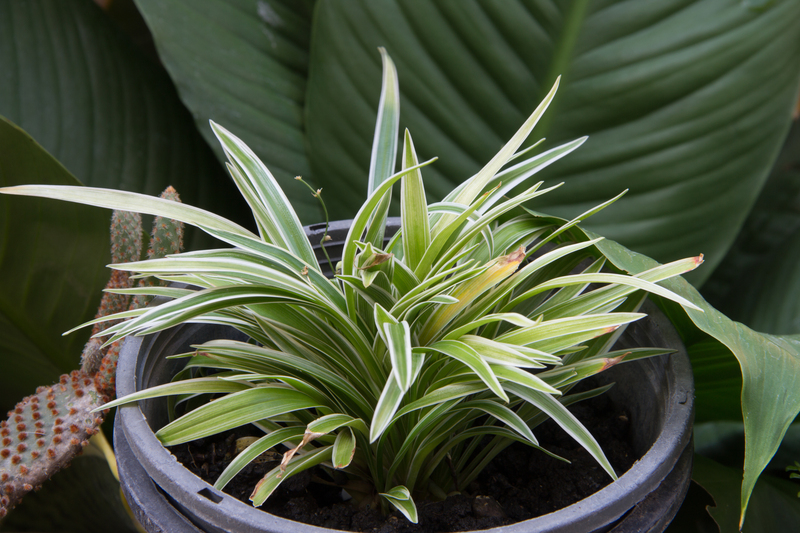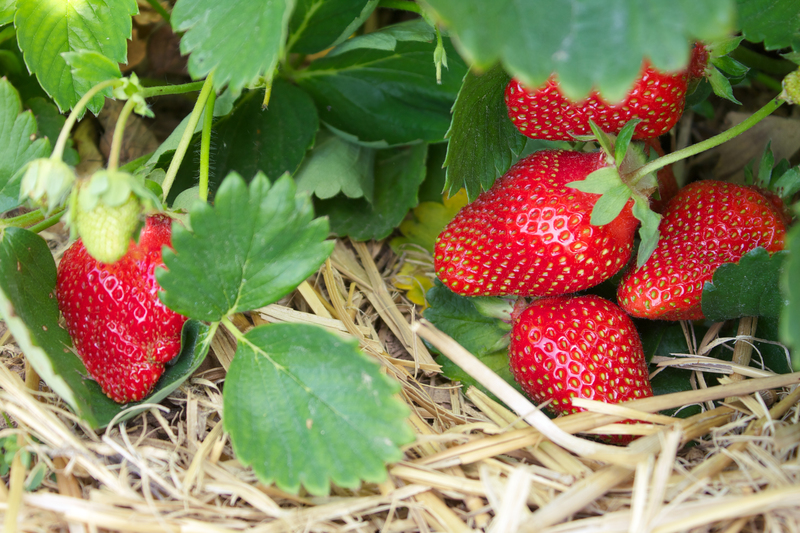Step-by-Step: 9 Tips for First-Time Gardeners
Posted on 22/08/2025
Step-by-Step: 9 Tips for First-Time Gardeners
Are you dreaming of harvesting your own vegetables, flowers, or herbs but have never picked up a trowel before? Getting started with your first garden can be exciting and a little overwhelming. Don't worry! This step-by-step guide provides you with 9 essential tips for first-time gardeners to help you cultivate a thriving and beautiful garden. Whether you're planting in a small urban space or your suburban backyard, these gardening essentials are tailored to beginners like you!
Table of Contents
- Choose the Right Location
- Know Your Soil
- Start Small
- Pick Easy-to-Grow Plants
- Invest in Quality Gardening Tools
- Master the Art of Watering
- Understand Sunlight Requirements
- Mulch for Success
- Learn From Mistakes
1. Choose the Right Location for Your First Garden
The foundation of any flourishing garden is its location. First-time gardeners often underestimate how critical sunlight, accessibility, and proximity to water are for plant health.
Sunlight Matters
- Most vegetables, flowers, and herbs need at least 6-8 hours of direct sunlight daily.
- Observe your yard or balcony and note where the sun shines longest throughout the day.
Accessibility & Water Source
- Choose a location that's easy to get to. If tending your garden feels like a chore due to distance, you're less likely to keep up with it.
- Being close to a water source means less time dragging hoses or watering cans around.
Tip: Avoid spots beneath large trees. Their roots will compete with your garden for water and nutrients, and constant shade will limit plant growth.
2. Know Your Soil Quality
Soil is the lifeblood of gardening! Understanding your soil type and amending it for optimum health is crucial for every beginner.
- Pick up a simple soil test kit from your local garden center or agricultural extension office.
- Assess your soil's pH, texture (sandy, clay, loamy), and nutrient levels.
- If your soil is poor, supplement with organic compost, mulch, or well-rotted manure to make it fertile and well-draining.
Pro Tip: Most garden plants thrive in soil with a pH between 6.0 and 7.0. Amending your soil accordingly creates the perfect home for your plants.
3. Start Small: Less is More for Beginners
It's easy for first-time gardeners to get carried away and plant more than they can manage. Start small to avoid burnout and frustration.
- Begin with a modest bed--about 4 feet by 4 feet is perfect for new gardeners.
- If space is tight, consider container gardening. Many vegetables and herbs thrive in pots or window boxes.
- As you gain confidence, you can expand your garden one season at a time.
Remember: A small, well-tended garden outperforms a large, neglected one.
4. Pick Easy-to-Grow Plants for Your First Garden
Some plants are more beginner-friendly than others. First-time gardeners should stick to varieties known for their resilience and productivity.
Vegetables and Herbs
- Lettuce, radishes, green beans, and zucchini are forgiving and grow quickly.
- Herbs like basil, chives, and mint are great for beginners and can even be grown indoors.
Flowers
- Sunflowers, zinnias, marigolds, and nasturtiums are hardy, cheerful, and easy to care for.
Bonus Tip: Read plant tags and seed packets carefully. They offer valuable insights into spacing, light needs, and growth habits.
5. Invest in Quality Gardening Tools
Good tools make gardening more enjoyable and effective. Gardening for beginners doesn't require every gadget on the market, but a few essentials will make a big difference.
- Hand trowel for digging small holes and transplanting.
- Pruning shears for trimming stems and deadheading flowers.
- Watering can or hose with adjustable spray setting.
- Garden gloves to protect your hands from thorns, blisters, and pests.
- Sturdy spade or shovel for preparing garden beds.
Quality tools last longer and reduce strain on your body. Invest in items that feel good in your hand and are built to last.
6. Master the Art of Watering
Overwatering and underwatering are two of the most common mistakes for first-time gardeners. Different plants have different water needs, but some universal guidelines apply:
- Water deeply rather than frequently. This encourages strong root growth.
- Water early in the morning to minimize evaporation and reduce the risk of fungal diseases.
- Use mulch to preserve moisture and prevent weeds.
- Stick your finger about an inch into the soil. If it's dry, it's time to water.
Pro Gardening Tip: Yellowing leaves often mean plants are receiving too much water, not too little!
7. Understand Your Plants' Sunlight Requirements
Each garden plant has unique sunlight preferences. First-time gardeners should group plants with similar light needs together for best results.
- Labels marked "full sun" need 6-8 hours of direct sunlight daily.
- "Partial sun" or "partial shade" plants do best with 3-6 hours of morning or filtered sunlight.
- "Shade" plants can tolerate less than 3 hours of direct light per day.
Tip: If your yard is mostly shady, don't be discouraged! Many leafy greens (like spinach and arugula) and decorative ferns thrive in less sun.
8. Mulch for Success: Keep Weeds and Pests at Bay
Mulching is one of the easiest steps to improve your first garden's performance. It acts as a protective barrier, offering numerous benefits:
- Suppresses weeds, reducing the time spent on tedious weeding.
- Conserves soil moisture and keeps roots cool during hot weather.
- Improves soil as it breaks down, adding organic matter.
Recommended Mulching Materials: Shredded bark, straw, grass clippings, leaves, or compost.
9. Learn from Mistakes and Celebrate Every Success
Gardening is an ongoing journey of discovery. Even expert gardeners make mistakes! The most important lesson for beginner gardeners is to observe, ask questions, and learn over time.
- Keep a simple gardening journal. Note what you plant, dates, weather, and results.
- Join local gardening groups or online forums to trade tips and seek advice.
- Take photos of your progress to track growth and remember what worked well.
- Be patient! Some plants take time to establish, but your efforts will pay off.
Remember: Every failed seed or wilted plant is a valuable teacher. Celebrate your achievements, no matter how small, and enjoy the journey!

Bonus Tips for Beginner Gardeners
- Rotate crops each year to prevent diseases and pests building up in the same spot.
- Label everything! Use waterproof tags to keep track of varieties and planting dates.
- Feed your soil. Topdress with compost each season to replenish nutrients naturally.
- Start a compost bin to recycle kitchen scraps and make your own "black gold."

Final Thoughts: Start Your Gardening Journey with Confidence
Starting your first garden is both a rewarding and therapeutic hobby. By following these step-by-step tips for first-time gardeners, you'll set yourself up for gardening success! Don't forget--every expert was once a beginner. The important thing is to get your hands dirty, keep learning, and enjoy the beauty that comes from your efforts.
What will you grow first? Share your gardening dreams and progress, and never stop exploring the wonderful world of plants. Happy gardening!
Frequently Asked Questions about Gardening for Beginners
- How much time does gardening take?
Starting small, you can easily manage most gardens with 15-30 minutes of daily attention during the growing season. - What are the easiest vegetables for beginners?
Lettuce, radishes, green beans, and zucchini are almost foolproof for new gardeners. - Should I start plants from seeds or buy seedlings?
Both are great! Seeds are cost-effective, but seedlings give you a head start; choose what fits your schedule and comfort level. - How do I keep pests away organically?
Try hand-picking, use floating row covers, encourage beneficial insects, and apply natural remedies like neem oil.
If you found these gardening basics for beginners helpful, bookmark this guide and share with your fellow novice gardeners. Here's to a bountiful first harvest!
Latest Posts
Vertical Gardening for Beginners
How to Maintain a Flourishing Garden through Winter
Experience a Weed-Free Garden with 3 Strategic Tips
Creating an Exciting and Safe Garden Haven for Youngsters
Overgrown to Outstanding: Kicking Off Your Garden Renovation



